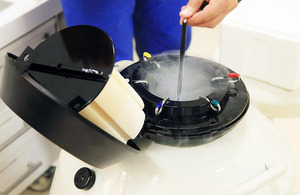People with HIV can now donate eggs or sperm to start a family
Change in law will allow people with non-transmissible HIV to donate gametes to partners.

- Thousands of same-sex couples with non-transmissible HIV are now able to donate eggs or sperm to their partners, giving more people the chance to become parents
- Law changes will also remove additional screening costs for female same-sex couples undergoing reciprocal IVF
- Update is part of work by government to improve access to fertility services
People with HIV are now able to donate their sperm or eggs to their partners, as the law in the UK is updated.
The Human Fertilisation and Embryology Act will be amended via a statutory instrument to allow people with non-transmissible HIV - with a viral load low enough not to pass on - to donate eggs or sperm, known as gametes, as part of fertility treatment to their partners.
Under current rules on in vitro fertilization (IVF), only a male partner with HIV can give their sperm to their female partner and not to anyone else.
The law change will also eliminate extra screening costs for female same-sex couples undertaking reciprocal (shared motherhood) IVF treatment. It is part of wider work to improve access to IVF for everyone and ensure same-sex couples have the same rights as a man and woman when trying to conceive.
Health Minister Maria Caulfield said:
These changes will allow more people to fulfil their dream of becoming parents.
We have changed the law to ensure equality for people living with HIV when accessing IVF, allowing them to donate their eggs and sperm. In addition, the change will allow female same-sex couples to access IVF with no extra screening costs, the same as heterosexual couples.
These changes will help create a fairer system by removing barriers to accessing fertility care as we have set out in the Women’s Health Strategy .
The changes to the law allow people with HIV to donate their gametes to family, friends and known recipients provided that:
- they have a sustained viral load of less than 200 per millilitre (‘undetectable viral load’), meaning that HIV cannot be passed on
- they have been receiving antiretroviral treatment for at least 6 months prior to donation
- the known recipient is aware of their HIV diagnosis and provides informed consent
The regulations include an updated definition of partner donation to enable female same-sex couples wishing to donate eggs to each other (reciprocal IVF) to undergo the same testing requirements as heterosexual couples.
Under current rules, female same-sex couples hoping to conceive via reciprocal IVF must first go through screening for syphilis and genetic screening, such as cystic fibrosis, which can cost over £1,000, while heterosexual couples do not need to undergo this screening.
Julia Chain, chair of the Human Fertilisation and Embryology Authority (HFEA), said:
The HFEA welcomes the news that legislation regarding partner donation in relation to reciprocal IVF, and gamete donation from those who have HIV with an undetectable viral load, has now been proposed in Parliament. Fertility treatment is helping more people than ever to create their family, and everyone undergoing fertility treatment should be treated fairly.
For known donation from individuals with undetectable HIV, we anticipate that the first clinics may be able to begin to offer this treatment around 3 months following a change in the law.
We encourage any patients or donors who may be affected by these changes to visit the HFEA website to find out free and impartial information, including about how to choose a fertility clinic.
Professor Kevin Fenton said:
The amendment to the act will help to benefit hundreds of couples, including same-sex male couples in a surrogacy where one or both have HIV, female same-sex couples planning shared motherhood and those seeking known donation from a friend or relative with HIV.
The government has taken steps to ensure greater IVF transparency in England through an accessible tool on GOV.UK to allow people to look up information about NHS-funded IVF treatment in their area.
Minister for Equalities, Stuart Andrew MP, said:
Treatment for HIV has improved significantly, saving countless lives, but the stigma surrounding it persists - a stigma which often prevents people from getting tested and seeking treatment. These changes will help to reduce that stigma, making it clear that people with HIV can live full and happy lives.
I am delighted by these changes which will enable more people to experience the joy of becoming parents.